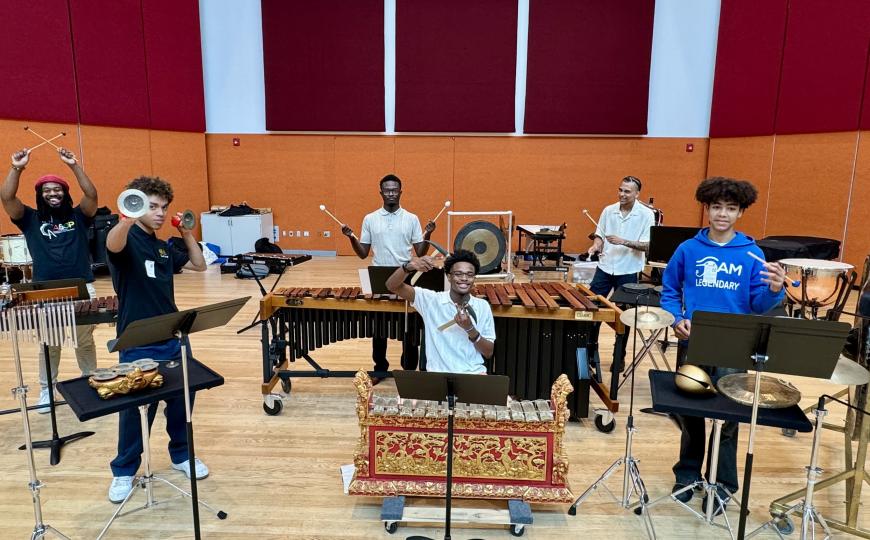Raynor Carroll has seen how the orchestral world works. The former principal percussionist of the Los Angeles Philharmonic and an experienced educator, Carroll has reached a prominent position to which few Black orchestral musicians — let alone percussionists — are admitted.
In a recent chat with SF Classical Voice, he recounted his experiences being one of the few Black musicians on many classical stages. This representation problem has been baked into the industry’s operating mechanisms over centuries. And though some organizations — such as the Gateways Music Festival and the Sphinx Organization — have dedicated themselves to the issue, the statistical picture is still far from equitable and requires serious investment in recruitment and educational pipelines to be rectified.
Carroll said he regards the work of organizations like Sphinx with admiration. “Still, though, I felt that there was a void. Many of these [organizations] are positioned to best support string players in [orchestral] and competition [settings].”
So as the early-2020s reckoning with systemic racial bias played out in public view, Carroll and several colleagues — all of them Black percussionists, most current or former orchestral principals — began an equally important set of conversations over Zoom. These conversations would lead to the formation of the Alliance of Black Orchestral Percussionists (ABOP) in 2021.
ABOP is at its heart a holistic mentorship program that pairs Carroll and his colleagues with proteges around the country. The current cadre of seven mentees — ranging from high schoolers to post-secondary students to recent Master of Music recipients — receives highly personalized support, sustaining their development and musical ambitions at every stage of their careers.
ABOP seeks to remove discipline-specific barriers for aspiring percussionists to enter the orchestral field. Working with a dozen partner organizations, ABOP provides students with equipment like mallets and cymbals, allowing proteges to master more quickly the dizzying array of instruments for which an orchestral percussionist is responsible. “Instruments, music, access — it’s so different for percussionists,” said Carroll. “To have regular access to instruments is just a huge advantage.”
Just as important are the less tangible lessons that mentors relay — unspoken conventions of orchestral and audition culture that might help proteges navigate scholastic and professional experiences. This guidance is invaluable, said Torrance Buntyn Jr., a recent master’s graduate of Southern Methodist University’s Meadows School of the Arts.
“When I started my grad school journey, ABOP’s [mentorship and support] were definitely things that I needed,” Buntyn remarked. “It was my first time in a music-school environment, and there was a lot I needed to learn, and ABOP really took me under their wing. Mallets, sticks, books, repertoire, [recording expertise], concert and performance experience — they gave me everything a percussionist needs to be in the audition circuit and [taught me] things you don’t always learn in school.”
But it’s not just the ins and outs of percussion studies that constitute the support pipeline. Carroll stressed the extent to which mentors make themselves available as advisers on how to navigate financial, familial, and other extramusical factors. And if students’ aspirations extend beyond a career as an orchestral percussionist, mentors do their best to foster these ambitions, too. Buntyn especially noted ABOP’s support for composition, film session playing, and other musical avenues outside the orchestral world.
Finally, Carroll said he hopes to create a sense of community through the program. “We love to see mentorship happening among the rank [of mentees] — they will one day be the leaders and mentors.”
This budding community centers around ABOP-in-LA, the organization’s annual in-person intensive for its fellowship class. Carroll noted with pride that, among the bevy of experiences offered to proteges during the week, the group was in near-unanimous agreement that the highlight of the intensive was the opportunity to bond with peers — in the downtime between sessions and during the group car rides and other social activities that one participant described as “like a road trip with your cousins” in a post-program questionnaire.
There is still much more that ABOP’s founders hope to accomplish. Carroll related the organization’s future goals — more mentors to match the volume of deserving applicants, the ability to provide for more significant instrument purchases (think timpani) — and ABOP’s needs, among them creating larger funding pipelines and reducing reliance on Zoom/virtual tutelage.
ABOP’s board members, who include Cleveland Institute of Music President and CEO Paul Hogle and Aspen Music Festival President and CEO Alan Fletcher, serve as crucial “mentors” for Carroll himself, the percussionist said. And ABOP’s organizational partners are just as important to its continued growth. 2023’s inaugural ABOP-in-LA took place mostly at Carroll’s home, but the 2024 iteration was hosted at the Beckmen YOLA Center and featured master classes, workshops, and a repertoire reading with the Inner City Youth Orchestra of Los Angeles (ICYOLA) that was open to the public.
Just as it takes a village to foster a musician, so too does it take one to steward an arts organization. ABOP’s village, already formidable, is poised to continue its growth.
